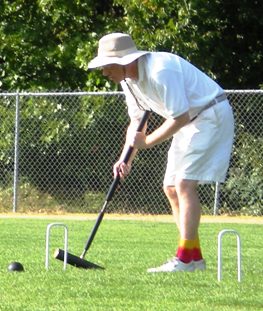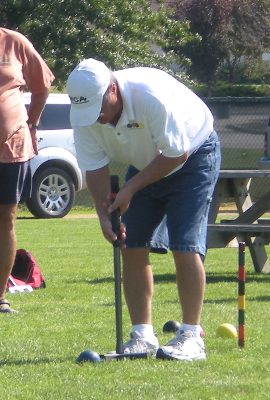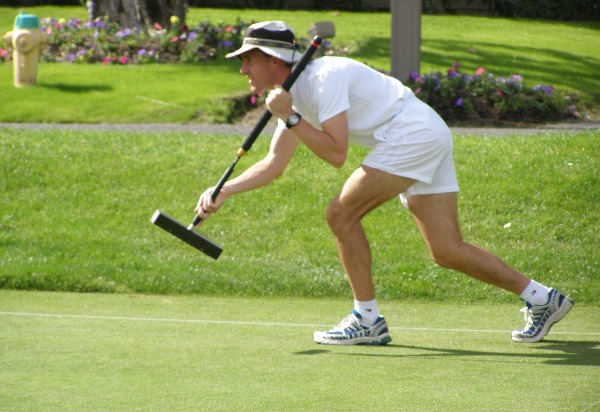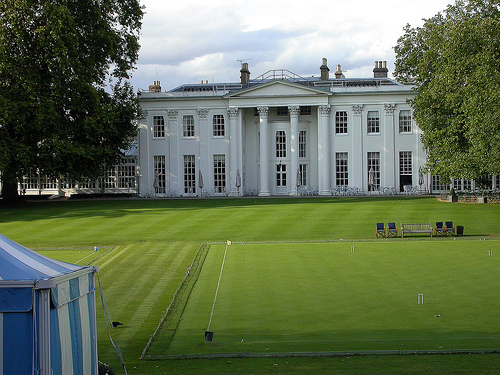 Cochran at 9W NationalsDuring interviews for the November issue, I had interesting conversations (via e-mail) with both Billy Bob Breeden and George Cochran on nine-wicket that I wasn't able to fit into the magazine story. Today I'm posting the discussion I had with George and I'll follow up later with Billy Bob's comments.
Cochran at 9W NationalsDuring interviews for the November issue, I had interesting conversations (via e-mail) with both Billy Bob Breeden and George Cochran on nine-wicket that I wasn't able to fit into the magazine story. Today I'm posting the discussion I had with George and I'll follow up later with Billy Bob's comments.
Dylan: Now that you have two years in for this event, how about we start with your impressions of the nine-wicket game and playing on the long-grass? Obviously, it would never compare to six-wicket, but does it offer appeal as a change-up type event or maybe on some other levels?
George: Your phrase "Obviously it would never compare to the 6-wicket game" would indicate that you believe the 9-wicket game to be an inferior version of croquet. I disagree. I love playing both American rules and International rules 6-wicket croquet, and I equally love playing 9-wicket croquet. The backyard game is neither better nor worse than croquet on groomed courts, but it is very different, and a person that ignores those differences is probably playing the game badly.
The first difference is in availability. Flat courts with golf-green grass are very expensive to both build and maintain, and so there are vast regions of the U.S. with very few such courts available. For example, there is not a single groomed croquet court in the entire state in which I live. But a backyard game can be set up anywhere, anytime, with relatively cheap equipment, and provide hours of fun. When I visit friends or family, we could set out some wickets and play, talk and drink beer in the back yard. I went to my high school class reunion a few years ago, which was held at a picnic pavillion next to a lake in a state park. There was a 9-wicket croquet court set up in the grass next to the pavillion and everyone had a blast knocking balls around.
The second difference is that the 9-wicket game is generally an aggressive and wide-open game, even more so than the Association game. Aunt Emma is a losing strategy in a 9-wicket tournament, as long as your mallet is weighted appropriately for the balls and grass on which you're playing. This is because the wickets are wider, making it easier to get through them from a distance and from an angle, and also easier to peel a dead ball through. Because there's no relief from wiring and the vagaries of the ground make long roquets uncertain, a player who has control of the balls can literally leave the opponent with no shot at the end of each and every turn. A well-played 9-wicket game will have a very aggressive early attack or rout, even if it results in a lot a deadness, because you can leave the opponent with no shot, it is easy to get clean, and gaining contol of the balls is paramount.
For players who are at the stage of learning various croquet shots (roll and split shots), the 9-wicket game offers a much more rewarding game in which to try those shots out. The distance between consecutive wickets is shorter and the angles on split shots are not as severe. And if the shot is off slightly, you generally still have a makeable wicket shot because of the generous hoops. The result is that an improving player can often run an all-around break and set a leave in a 9-wicket game, while the same player in a 6-wicket game would make a couple of hoops and then break down dead and be forced to sit for a long time. My club runs a "Leisure Class" on croquet, and we use the 9-wicket game for all but the last class-day for this reason...the 9-wicket game can be less frustrating.
Of course, there are more randomizers in the backyard game. The ground can be bumpy or slope off, the grass is not uniform, sometime balls can be defective. A type-A personality can find these random variations aggravating. I just accept them as being a part of the game that makes it interesting, and try to play the lie as best I can. I often misjudge slopes with soft shots. When I have these misses, I just try to make a mental note of the location, the shot and the curve and try to get better at it. At least everyone is playing on the same ground and trying to get through the same wickets.
Very slow or very long grass can be frustrating, but that's not the fault of the grass but more the fault of not having the right mallet at the game for the conditions, and for failing to adjust your game strategy to fit the speed of the lawn. If you are flexible enough to adjust your game for the types of shots that you can actually do with the grass, balls and mallet that you are using, then the "slow" game can be a lot of fun too. Not better or worse, just different.
This whole discussion reminds me of the unrelated issue of the relative merits of golf croquet. There are some in the croquet world who dismiss golf croquet because it has no croquet shots. Someone who gets all of their enjoyment from croquet shots would probably not get much pleasure shooting golf croquet. But I find the game fascinating, frustrating, and a hell of a lot of fun. Strategy in golf croquet is deep and nuanced. I just wish I could shoot better. The game really emphasizes the kinds of shots at which I'm weak. Compared to "regular" croquet, it is not better or worse, but it is definitely different.
Dylan: Do you see nine-wicket as a way to build organized croquet play in areas where six-wicket courts are not available? Do you think it is the kind of game that you could build a club around? You mention that your club uses nine-wicket for teaching, what kind of field do you use?
George: Absolutely! The club in Baton Rouge played only 9-wicket croquet for two years before we even knew that the USCA existed. We all knew the 9-wicket game and had never heard of any other variations. We played (and still do) in a public park on long grass that's mowed fairly short, on a 2/3 size court. There are no golf-green grass courts in Louisiana. Just recently a couple of guys coming off the nearby golf course stopped and watched us, and then got in a game. It turns our that they have been hosting a regular Thursday night cutthroat 6-ball 9-wicket game in their backyard for several years, as kind of a neighborhood party. After playing with us a few times they just recently joined the USCA and are turning into croquet fanatics. Would they have been as interested in joining us if they hadn't already been playing 9-wicket croquet regularly? Probably not.
The 9-wicket game has three things going for it:
1) Everyone knows some variation of it
2) You can set it up anywhere, and
3) For a serious improving player, roll and split shots are more rewarding with less downside when they go bad, and it's relatively easy to score multiple hoops in a turn.
For these reasons I believe it makes a great game for teaching skills with croquet shots and for recruiting people into the serious side of the game.
 Breeden during the 9W doubles championshipThis is a follow up to yesterday's post on George Cochran. During interviews for the November issue of the magazine, I had interesting conversations (via e-mail) with both Billy Bob Breeden and George Cochran on nine-wicket that I wasn't able to fit into the magazine story. Today I'm posting the discussion I had with Billy Bob. Here's a link to the conversation with George.
Breeden during the 9W doubles championshipThis is a follow up to yesterday's post on George Cochran. During interviews for the November issue of the magazine, I had interesting conversations (via e-mail) with both Billy Bob Breeden and George Cochran on nine-wicket that I wasn't able to fit into the magazine story. Today I'm posting the discussion I had with Billy Bob. Here's a link to the conversation with George.




